- Home
- T.A. Barron
The Raging Fires Page 12
The Raging Fires Read online
Page 12
I kneeled by the water’s edge. Cupping my hands, I dipped them into the chill torrent, then washed my mud-splattered face. Finally, I dug the mud out of my scabbard. After several thick clumps worked loose, the sword at last came free.
I ran my finger over the silver hilt, shining in the spray. Maybe the killer was not just an enemy of dwarves, nor even of men and women, but of all life on Fincayra. Someone who might actually benefit from Valdearg’s terror. Someone like . . . Rhita Gawr.
Wiping my face on my sleeve, I frowned. No, no, that couldn’t be it. As Rhia herself had chided me, there was no point in creating new enemies. I had enough trouble right now. And yet . . . who else, besides Rhita Gawr, might be cunning enough to find the dragon eggs and ruthless enough to destroy them at birth?
Something soared over my head, darkening the mist. Valdearg! He had returned!
At that instant, a high, piercing shriek sliced through the moist air. It was not, I knew at once, the sound of a dragon. For this sound had assaulted me once before. I could not mistake it.
It was the cry of a kreelix.
I turned skyward just as the bat-like wings appeared out of the mist. The kreelix dove straight at me, its deadly fangs exposed. My hand reached for the hilt of my sword—then froze.
What good was my blade? I could not forget the last time I had faced those fangs, under the Cobblers’ Rowan. The shock. The sheer pain. Though I had none of my own magic left, I still had the fear.
Plunging downward, the kreelix opened its bloodred mouth. Three deadly fangs arched toward me. Another shriek tore through the swirling mist. The claws raised to slice me to shreds.
Suddenly a dark form bolted out of the fog across the river. Eremon! Clearing the waterway in a great bound, the stag leaped right into the path of the kreelix. With a colossal thud, they met in midair. I jumped out of the way as they came crashing down into the bank. Mud sprayed in all directions.
The two of them tumbled into the river. Eremon gained his legs first and lowered his rack to charge. But the kreelix, shrieking vengefully, lashed out with its claws, ripping the stag’s flank. Even so, Eremon plowed straight into the beast, impaling one of its wings. Blood, both red and purple, swirled in the churning waters.
I drew my sword—just as a flash of scarlet light erupted. Above the distant ringing of my blade, I heard Eremon’s sharp cry as the kreelix struck again. The great stag faltered, slumping in the middle of the river. I leaped into the spray, swinging my sword as I ran through the waves.
The kreelix whirled around. Like an enormous bat, fangs bared, it swiped at me with its uninjured wing. I dodged—but a bony edge gouged my cheek. As I jabbed my blade at its chest, a river stone slipped under my foot, sending me careening backward. The sword flew out of my hand. Icy water rushed over me.
Before I could right myself, something heavy fell on top of me, pushing me deeper underwater. My ribs collapsed. I gagged, swallowing water, struggling to escape from the mass of fur that crushed my face and chest. My lungs screamed, my mind darkened.
All at once, a strong hand grabbed my arm and pulled me free. Air filled my lungs at last, though I coughed uncontrollably, spewing water like a fountain. Finally, the spasms quieted enough that I could make out Hallia, in her human form, dragging me from the river. She dropped me, sputtering, at the water’s edge, then left immediately.
After a moment, I raised myself on my elbow. Just downriver lay the half-submerged body of the kreelix, the broken shard of an antler lodged in its back. Then a realization colder than the frigid waves washed over me. On the other side of the kreelix lay another body, sprawled on the muddy bank. The body of Eremon.
I rose and stumbled to his side. Hallia, sitting in the mud, was cradling the stag’s head upon her lap. Her long face creased in sorrow, she seemed oblivious to the blood seeping into her robe from the puncture in his neck. Wordlessly, she stroked his forehead and his shattered antler, all the while looking into his deep brown eyes.
“My brother,” she said softly. “You mustn’t die, oh no. You mustn’t leave me.”
Eremon’s chest shuddered as he tried to draw a breath. “I may be dying, my Eo-Lahallia. But leave you? That . . . I will never do.”
Her own immense eyes peered into his. “We have so much yet to do, you and I! We still haven’t run through the Collwyn Hills in the flower of spring.”
His face tightened, and his hoof nudged her thigh. “You know how much I long to run by your side as a deer. And to stand by your side as a man. Yet now . . . I lack even the strength to change back into man form.”
“Oh, Eremon! This is worse, far worse, than my dream.”
“Here,” I offered, starting to rise. “I could make you a poultice that might help.”
Eremon’s hoof knocked into me. His gaze, stern but kind, seemed to swallow me whole. “No, young hawk. It’s too late for such things. Or even for your powers, if you still had them.”
I bit my lip. “Whatever powers I once had are just a torment now.”
“The kreelix . . .” he began, before taking a halting breath. “It was a kreelix, wasn’t it? A magic eater? I thought they had all been destroyed. Long ago.”
“So did my tutor, Cairpré.”
Eremon blinked. “The bard Cairpré is your tutor? You are blessed indeed.”
My brow knitted. “The only blessing I seek is to do something to help you. Now, Eremon.”
Ignoring my comment, he asked, “But where . . . did the kreelix come from? Why did it attack you?”
“I don’t know. Cairpré thinks someone is raising them, training them to kill.”
With difficulty, he swallowed. “The kreelix—it thought you still possessed magic. Or else it wouldn’t have attacked you.”
I shook my head. “The only magic I possess is what you gave me. It must have sensed that.”
Eremon winced. He turned toward his sister. “Forgive me.
Blinking back her tears, she answered bitterly, “I will try.”
A wave of spray lifted off the water and settled on the stag with the softness of a candle’s glow, caressing his bloodstained body. Another wave of spray came, then another. Almost as if the river itself were grieving, no less than Hallia and myself. Then I noticed that the air around us had begun to quiver, to shimmer, like the veil of mist that separated this world from the Otherworld. In that moment, I sensed somehow that another presence, more elusive than the mist itself, had joined us.
Hallia cocked her head, first in doubt, then in surprise, as she felt something change in her brother’s body. His glistening muscles relaxed. His face, newly becalmed, tilted slightly, as if he were listening to someone’s whispered words. When at last he spoke, grief still tinged his voice. Yet the old resonance had returned, along with a touch of something else, something I could not quite name.
“My sister, the spirits have come—to take me, to guide me on the Long Journey. Yet before I go, you must know that I, too, have had a dream. A dream . . . about a time when you shall overflow with joy, as the river in spring overflows with water.”
Hallia’s head fell lower, almost touching his own. “I cannot imagine such a time without you.”
His breathing slowed, and he spoke with more effort. “That time . . . will come to you, Eo-Lahallia. And in the days before then, in your moments of fear and in your moments of repose . . . I myself will come to you.”
Shutting her eyes, she turned away.
Eremon’s hoof quivered, brushing my hand. “Be . . . brave, young hawk. Find the Galator. You have more power . . . than you know.”
“Please,” I begged. “Don’t die.”
The deep brown eyes closed, then fluttered briefly. “May green meadows . . . find you.”
He exhaled one last time, then lay still.
19: THE WHIRLWIND
Swathed in mist, Eremon’s blood running down our arms, Hallia and I strained to carry the stag’s heavy body over to a protected bend in the riverbank. There a patch of vibrant
green grass sprouted, and there we dug his grave in the moist, rich soil. Hallia wove a funeral shawl from shoots of eelgrass, which she carefully draped over his neck. After filling in the grave, I set out to ensure that it would remain undisturbed. Weary though I was, I carried more than a dozen stones to the spot. Hefty ones. Yet as much as my back ached, my heart ached even more.
As I worked, Hallia stood in silence by the grave, an occasional tear drifting down her chin. Although she said nothing, she sometimes clutched her yellow robe or stamped the turf, testimony to the violent storms raging within her. My stone gathering completed, I stood nearby, hardly daring to look at her, let alone comfort her.
At last, without lifting her eyes from her brother’s grave, she spoke. “He called you young hawk.”
Silently, I nodded.
“It is a name with a meaning for my people.”
I said nothing.
Still without looking at me, she continued, her voice sounding far, far away. “There is a story, as old as the first track of the first hoof, about a young hawk. He befriended a fawn. Brought him food when he hurt his leg, led him home when he was lost.”
I shook my head. “Your brother had faith in me. More than I do myself.”
Her round eyes flitted my way. “In me, too.” She sighed heavily. “Soon you will be going, I suppose.”
“That’s right.”
She threw her braid over her shoulder. “Well, if you think I’m coming with you, you are mistaken.”
“I never asked—”
“Good. Because if you did, my answer would be no.” She kicked at one of the river rocks. “No, I say.”
I studied her for a long moment. “I didn’t ask you, Hallia.”
“No, but he did.” She glared at the stones. “He asked me. Not with his words, but with his eyes.”
“You should not come. You’ve suffered enough.”
Her head bowed. “That I have.”
Spying my sword on the bank, I crouched by the river, washing the mud from its blade. Somberly, I replaced it in the scabbard. Then, my feet feeling heavier than the stones I had laid upon Eremon’s grave, I stepped slowly over to Hallia. She did not move, merely watching me with her gaze so full of intelligence and grief. A pace away, I stopped.
I felt the urge to take her hand, but held myself back. “I am sorry. Truly sorry.”
She did not respond.
For several minutes we stood there, stiff and silent. But for the swirling mist, weaving about our legs, and the churning waters of the River Unceasing, nothing moved, nothing changed. I felt again the profound stillness that I had sensed inside the living stone. And, somewhere deep within, the quiet magic of a deer.
Out of nowhere, a sharp gust of wind struck us. Hallia’ s robe flapped against her legs. Spray flew off the river, drenching us; mist shredded into nothingness. The wind accelerated—howling, driving us both backward. Hallia cried out as her braid lifted straight up from her head. Hard as I tried to keep my balance, the wind sent me careening on the slick mud. I fell toward the river, about to hit the water, when—
I never hit.
Suddenly I was airborne, carried aloft by the fierce, whirling winds. My tunic flapped and billowed, sometimes covering my face. Hallia’s foot struck me as she tumbled through the air nearby, but when I called to her the wind forced the words back into my throat. Spinning wildly, we rose higher into the air.
At one point, through the spiraling mist, my second sight glimpsed the patch of vibrant grass where we had buried Eremon. Just upstream, the remains of Valdearg’s eggs lay scattered. Then thick clouds swallowed up everything, even as the wind had swallowed us. The whirling currents screamed in my ears.
Jostled and spun relentlessly, thrown upside down and sideways, I lost any bearings that I might have possessed. My body felt stretched, pummeled, turned inside out. Assaulted—from every side at once. Eyes watering, I could barely breathe amidst the battering winds. Was Hallia doing any better? Wherever this whirling storm was carrying us, I only hoped that we might arrive there alive. Before long, I fell unconscious.
When I awoke, I found myself sprawled facedown on a floor of smooth flagstones. Still whirling, my head pulsed with a roaring sound, as endless as ocean waves. I clung to the stones—they seemed so solid!—for a few more seconds before willing myself to turn over. At last I summoned the strength to roll onto my back. Weakly, my head still spinning, I pushed myself into a sitting position.
Hallia, I realized, lay beside me. Her face looked pale; she breathed fitfully. Her tan-colored hair, no longer tied in a braid, spread across the stones. I reached an unsteady hand toward her, when suddenly I caught myself.
That roaring sound . . . not my head, not the ocean, but voices. Hundreds and hundreds of voices. All around us, all shouting.
The two of us lay in the middle of a great circle of seats, filled with clamoring people. An amphitheater! Although I had never seen one before, I remembered well my mother’s descriptions of the Roman amphitheaters during my childhood in Gwynedd. They were, she had explained, colossal arenas for sports—and, sometimes, for sacrifice.
Dizzily, I shook the fog from my second sight, trying to take it all in. The flagstone floor stretched wider than any courtyard I had ever seen, all the way to the rows upon rows of people encircling us. Many waved fists at us, making me feel that their shouts were more likely taunts than cheers.
All of a sudden, a huge pair of doors flung open at the far end of the amphitheater. Out of the darkness galloped an immense black stallion, pulling a wheeled chariot. Seated in the chariot, a muscled warrior raised his burly arms to the crowd. As they bellowed encouragement, he cracked his whip over the horse’s streaming mane, driving the chariot directly toward us.
He’s going to trample us! The realization shot through me like a bolt of lightning.
Struggling to my feet, I reached under Hallia’s arms. Desperately, I tried to lift her onto my back. All the while, above the roaring crowd, I heard the pounding of the stallion’s hooves on the stones. Closer drew the chariot, and closer.
At last, shaking with the weight, I managed to lift Hallia off the floor. Glancing behind, I saw the crazed eyes of the horse and the triumphant smile of the warrior bearing swiftly down on us. My heart slammed against my ribs. I took one halting step, then another. The crowd thundered angrily.
My legs buckled beneath me. I collapsed to my knees. Hallia toppled, hitting the floor with a loud moan. I swung my head around, an instant before the chariot crushed us beneath its wheels. Instinctively, I threw myself in front of her.
Just then, the chariot melted into the air. So did the amphitheater, the crowd, the roaring cries. All that remained were the stones, the black stallion, and the warrior himself. Eerie blue lights flickered around the edges of the room, if this really was a room, yet I could see no more. No walls, no ceiling. Only darkness, tinged by the dancing blue lights on the horizon.
With one hand hooked on his gleaming breastplate and the other grasping the whip, the warrior strode over. Grinning down at us, he cackled with evident satisfaction. Then, miraculously, he too began to change. His bearded face grew wider and smoother, as all the hairs vanished. Two triangular ears sprouted, along with a shriveled wart in the center of the high forehead. Across the hairless scalp, wrinkles ran like furrows in a field. Two ancient eyes, blacker even than my own, peered at me. Only the warrior’s grin remained, though it was studded with bent, misshapen teeth.
“Domnu,” I rasped, my throat suddenly dry.
“Such a pleasure to see you again, my pet.” She patted her sack-like robe and began circling us, her bare feet slapping against the stones. “And you gave me such a splendid chance to drive that chariot! The humans, all told, are not much for ideas. But those Romans had a good one there.”
She paused, scratching the wart on her forehead. “Or was it the Gaels? The Picts? No matter—humans, of whatever sort. An unusually good idea they had. Even if they lacked the imagination t
o make it more exciting.”
The black stallion stamped his hoof and whinnied loudly. Domnu stopped circling and glanced at the powerful steed. The tips of her teeth showed as her grin widened. Her voice grew more quiet, and even more menacing.
“Are you disagreeing, my colt? Was the excitement too much for you?” She stepped closer and slowly ran her hand down the stallion’s nose. While quivering slightly, he continued to hold his head high. “Perhaps you would rather go back to being a chess piece?”
At once, I remembered the chess piece of a black horse that I had seen when I first visited Domnu’s lair. He had shown spirit then, as he did now. And he reminded me vaguely of that horse . . . that stallion. What was his name? I chewed my lip, recalling those days, long ago, when I felt my father’s strong arms wrapped around me, and the still stronger back supporting us, as we rode around the castle grounds. Whatever else I had forgotten, I could never forget the stallion’s prancing gait, his dignified air. And the way he ate apples out of my hand.
As Domnu continued to speak to the stallion, Hallia shifted beside me and opened her eyes. Seeing the hairless hag, she stiffened. Although a bit of the color had returned to her cheeks, I knew that she was probably still very weak.
“Are you able to stand?” I whispered.
“I . . . don’t know.” She observed me worriedly. “That wind . . . where are we? Who is that . . . hag? What have I missed?”
“A lot.” I gave her a wry smile. “You wouldn’t believe me if I told you.”
Hallia frowned. Taking my arm, she raised herself to her knees. Her eyes darted to Domnu once more. “She makes me . . . shiver. Who is she?”
“Domnu. I think we’re in her lair.”

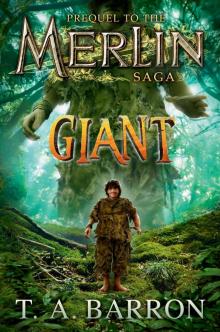 Giant
Giant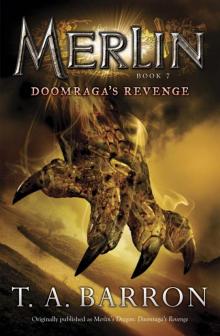 Doomraga's Revenge
Doomraga's Revenge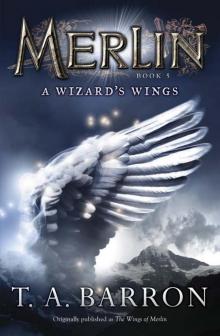 A Wizard's Wings
A Wizard's Wings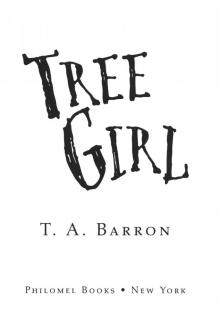 Tree Girl
Tree Girl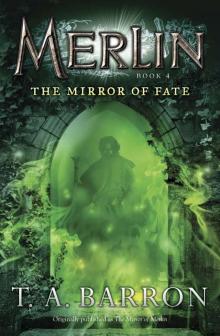 The Mirror of Fate
The Mirror of Fate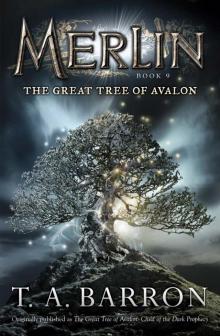 The Great Tree of Avalon
The Great Tree of Avalon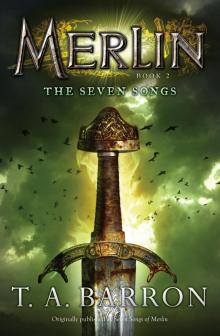 The Seven Songs
The Seven Songs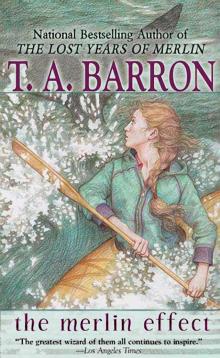 The Merlin Effect
The Merlin Effect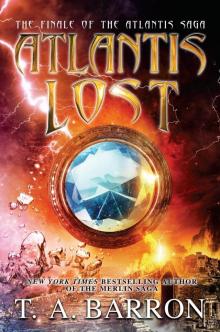 Atlantis Lost
Atlantis Lost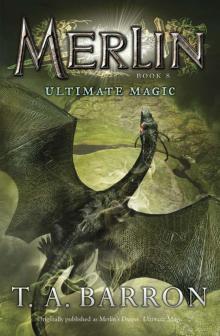 Ultimate Magic
Ultimate Magic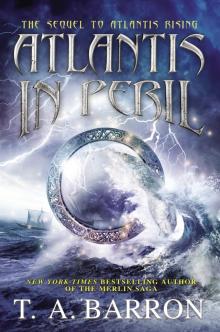 Atlantis in Peril
Atlantis in Peril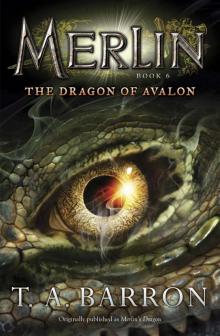 The Dragon of Avalon
The Dragon of Avalon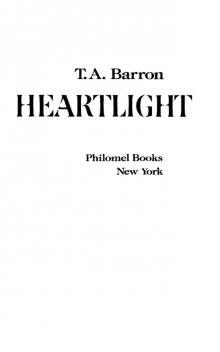 Heartlight
Heartlight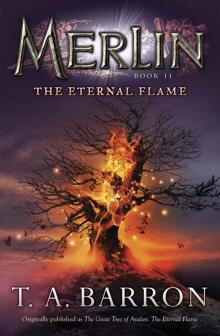 The Eternal Flame
The Eternal Flame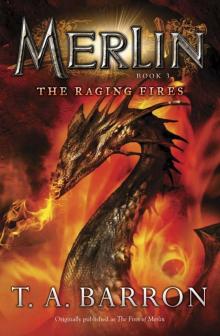 The Raging Fires
The Raging Fires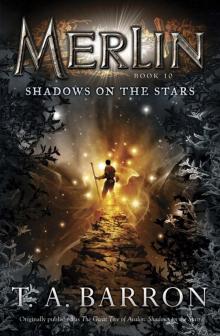 Shadows on the Stars
Shadows on the Stars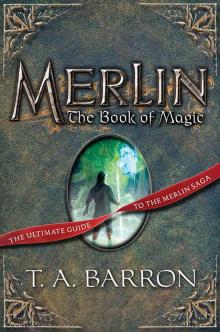 Merlin: The Book of Magic
Merlin: The Book of Magic The Lost Years
The Lost Years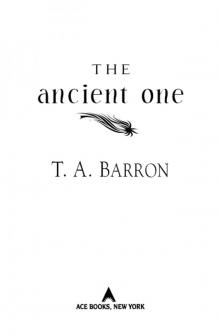 The Ancient One
The Ancient One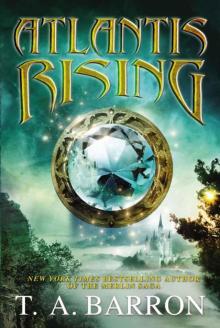 Atlantis Rising
Atlantis Rising